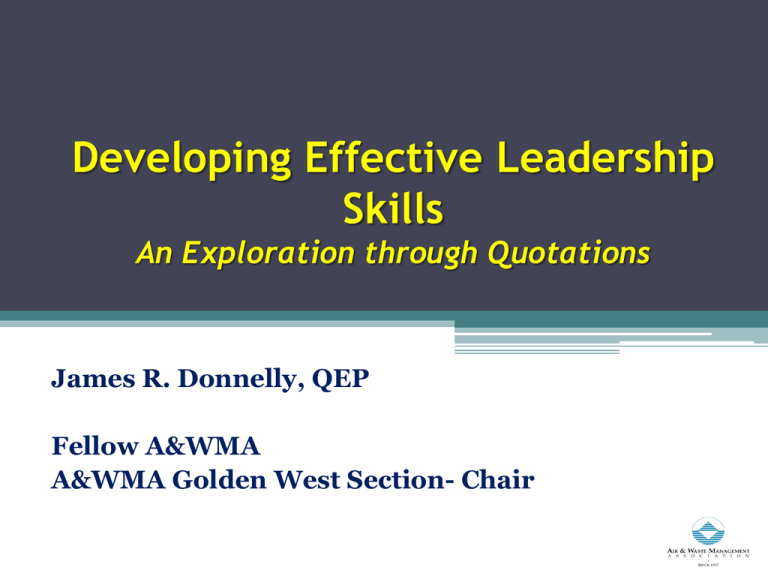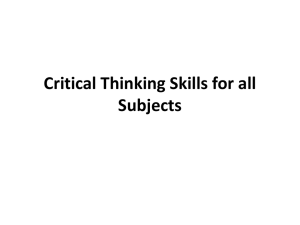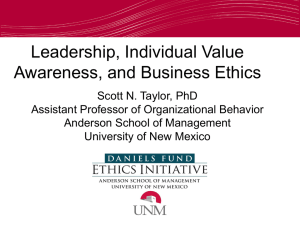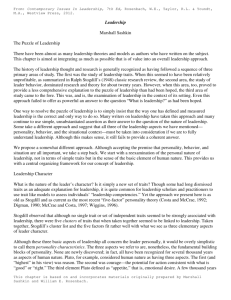James R. Donnelly - Developing Effective Leadership Skills
advertisement

Developing Effective Leadership Skills An Exploration through Quotations James R. Donnelly, QEP Fellow A&WMA A&WMA Golden West Section- Chair Topics to Consider • What is Leadership? • How does it differ from Management? • What makes for good Leaders? • What are keys to inspiring others to achieve more than they ever dreamed possible? • Effective Leadership Tips What Is Leadership? What are your thoughts? How do YOU define Leadership? Who are some great leaders and why? What Is Leadership? Leadership is one of the most observed and least understood phenomena. James MacGregor Burns In Sanskrit literature 10 types of leaders are identified. What Is Leadership? If the blind lead the blind, both shall fall in the ditch. Jesus Christ Lead, follow or get out of the way. Unknown What Is Leadership? “The art of Imposing one’s will upon others in such a manner as to command their obedience, their confidence, their respect and their loyal cooperation.” U. S. Military Academy, 1925 What Is Leadership? “Many people tell me Leadership is just “Common Sense.” So, What is “common Sense?’ What Is Common Sense? Common Sense is not a simple thing. Instead, it is an immense society of hard-earned practical ideas- of multitudes of lifelearned rules & exceptions, dispositions and checks. Unknown What is Leadership? Dictionary Definitions: to guide by the hand, to conduct to any place, to conduct as head or commander, …, to guide, show the method of… Samuel Johnson’s (1755) to draw, entice, allure; prevail on, influence; to pass, spend, that is to draw out; to exercise dominion….Webster’s, An American Dictionary of the English Language (1828) What Leadership is not! Control is not leadership; Management is not leadership; Leadership is leadership If you seek to lead, invest at least 50% of your time in leading yourself—own purpose, ethics, principles, motivation, conduct. Invest at least 20% leading those with authority over you and 15% leading your peers.“ Dee Hock- Founder and CEO Emeritus, Visa What is a Leader? The leader is one who mobilizes others toward a goal shared by leaders and followers. ... Leaders, followers and goals make up the three equally necessary supports for leadership.“ Gary Wills, Certain Trumpets: The Call of Leaders What Is Leadership? "All Leadership is influence.“ John C. Maxwell, Injoy, Inc Leadership as an Influence Relation “Leadership is an influence relationship between leaders and followers who intend real changes that reflect their mutual purposes” Joseph C. Rost, Leadership for the 21st Century Leadership as an Influence Relation “Leadership is an influence relationship between leaders and followers who intend real changes that reflect their mutual purposes” Joseph C. Rost, Leadership for the 21st Century Leadership Theories • Trait Theory (Great man Theory) • Behavioral and Style theories • Situational and Contingency theories • Functional theory • Excellence Theory • Transactional and Transformational theories Excellence Theory of Leadership Leadership produces excellent organizations because leaders are great executives who have certain traits (high energy, trustworthiness, charismatic personality, visionary purpose, honest communication, obsession with goals) that help them choose the correct behaviors (challenge the process, model the way, manage by walking around, position the organization, manipulate the culture, encourage the heart, empower collaborators & stick to the knitting) so that they might do the right thing in key situations by facilitating the work group democratically but forcefully Transactional vs. Transformational Leadership Transactional Managerial leadership, focuses on the role of supervision, organization, and group performance Leader promotes compliance of his followers through both rewards and punishments. Leader as “Boss” Transactional vs. Transformational Leadership Transformational Enhances motivation, morale, and performance of followers through a variety of mechanisms. Connects follower's sense of identity and self to the project and the collective identity of the organization Leader as role model Four elements of Transformational Leadership 1. Individualized Consideration Attends to each follower’s needs 2. Intellectual Stimulation Challenges Assumptions, takes risk, solicits follower’s ideas 3. Inspirational motivation Articulates a vision appealing &inspiring to followers 4. Idealized Influence Provides role model of high ethical behavior Transactional vs. Transformational Leadership Transactional Transformational Leadership is responsive Leadership is proactive Works w/in Organizational Structure Reward & Punishment by leader Motivates by appealing to self-interest Management by Exception Works to change organizational culture Achieve objectives via higher ideals Motivate by encouraging group interests Individualized consideration How does leadership differ from Management? “Management is: “Getting things done through other people.” American Management Association (1972) How does leadership differ from Management? Management is hierarchical Management involves power by position. Managers administer, leaders innovate & motivate How does leadership differ from Management? How does leadership differ from Management? "People ask the difference between a leader and a boss. The leader leads, and the boss drives." — Theodore Roosevelt How does leadership differ from Management? “A leader leads by example not by Force.” -Sun Tzu How does leadership differ from Management? "Management is efficiency in climbing the ladder of success; leadership determines whether the ladder is leaning against the right wall." — Stephen R. Covey Why Does Leadership matter? Leading “volunteers” is difficult, they have less incentive to stay. If someone does not like our vision or our leadership, they will leave. What makes for good Leadership? "You cannot be a leader, and ask other people to follow you, unless you know how to follow, too." —Sam Rayburn "Look over your shoulder now and then to be sure someone's following you." — Henry Gilme What makes for good Leadership? “A leader leads by example, whether he intends to or not.” —Unknown You do not lead by hitting people over the head - that's assault, not leadership. — Dwight D. Eisenhower What makes for good Leadership? It is all about shared beliefs, values and visions! Beliefs - assumptions or convictions that a person holds to be true regarding people, concepts, or things. Values - ideas about the worth or importance of people, concepts, or things. They come from a person's beliefs It is about respect for one another! Values and Leadership “Personal Leadership is the process of keeping your visions and values before you and aligning your life to be congruent with them.” -Steven Covey “It is not hard to make decisions when you know what your values are.” -Roy Disney The Role of Values in Leadership "Lasting change is a series of compromises. And compromise is all right, as long your values don't change." - Jane Goodall “Values are like fingerprints. Nobody's are the same, but you leave 'em all over everything you do.” -Elvis Presley Work Beliefs vs. Personal Beliefs Personal Beliefs are based the values that you believe to be true or right. These beliefs drive your personal decisions and behaviors in every day life Work Beliefs are the values and expected behaviors the organization believes to be true or right for the safety of our employees and the success of the company Work Beliefs vs. Personal Beliefs A conflict between your personal beliefs and organizational beliefs create opportunities for decisions in the workplace that are not consistent with corporate values or beliefs As leaders, social relationships can create situations where your personal beliefs interfere with your ability to hold others accountable Leaders are expected to maintain consistency between positive work beliefs and positive personal beliefs, creating a safe and healthy workplace and a successful organization What makes for good Leadership? Shared Values! The Mission of A&WMA is to assist in the professional development and critical environmental decisionmaking of our members to benefit society. The core Purpose of A&WMA is to improve environmental knowledge and decisions by providing a neutral forum for exchanging information. What makes for good Leadership? Be gentle and you can be bold; be frugal and you can be liberal; avoid putting yourself before others and you can become a leader among men. -Lao Tzu What makes for good Leadership? Knowing Yourself And Knowing Those You Lead What makes for good Leadership? So it is said that if you know your enemies and know yourself, you can win a hundred battles without a single loss. If you only know yourself, but not your opponent, you may win or may lose. If you know neither yourself nor your enemy, you will always endanger yourself. Sun Tzu ~510 BC What makes for good Leadership? If you don’t know yourself and you don’t know where you are going, How can you possibly lead others? What makes for good Leadership? If you don’t know the people on your team, How can you know how to lead them? Practical Tips on Good Leadership Five Principles of Marine Corps Leadership 1. You must be Technically and Tactically Proficient 2. Make Sound and Timely decisions 3. Set the Example 4. Know your men and lookout for their welfare 5. Train your men as a team 42 Principles of Marine corps Leadership 1. You must be Technically and Tactically Proficient You must know what you are doing. You must know where you are going. You must know how what you are doing fits into the bigger picture. 43 Principles of Marine corps Leadership 2. Make Sound and Timely decisions A good decision made timely is better than a great decision made too late. It is better to fail for what you did than for what you didn’t do. 44 Principles of Marine corps Leadership 3. Set the Example You lead by example Expecting the people you lead to meet higher standards than you exhibit is stupidity. 45 Principles of Marine corps Leadership 4. Know your men and lookout for their welfare Know the people on the team If people trust you the will follow you. If people don’t trust you the won’t ! 46 Principles of Marine corps Leadership 5. Train your people as a team Everyone can be replaced, even you Train up and train down The difference between a platoon commander and a platoon sergeant is: 1 Bullet ! Practical Tips on Good Leadership “Any leader wields only as much authority and influence as is conferred by the consent of those he leads” -Nathaniel Fich Cpt. USMC (R) “One Bullet Away; The Making of a Marine Officer (2005)” Leadership Amplitude Your behavior will be magnified by others Others may not confide in you based on previous responses to good/bad news Pride can be seen as ego and amplified Expressions can be amplified (lack of attention, rolling of the eyes, demeaning answers) Others will expect more from you as a leader Social Contracts (friendships) can be used Leadership Lag Time it takes a leader or an organization to identify an issue or opportunity & take successful action Recognizing an issue or opportunity (Awareness) Deciding what action to take and avoiding “Analysis Paralysis” (Action) Taking on purpose action in a timely manner (Accountability) Taking no action may send a negative message to the organization and can be viewed as not caring Five Stages of Leadership Development Survival Hierarchical Dynamic Collaborative Organic Survival Control & Discipline World is Dangerous Rule is largely Inflexible Leadership style- Authoritarian Hierarchical World is Orderly & Systematic Place People value Authority & Tradition Linear Thinking Look for Efficiency Relies on Duty & Loyalty Leadership Style- Manager Dynamic Potential for Chaos & Turmoil Focus on effective Relationships, Team Building & Process Self-directive Learning Leadership Style- Facilitator Collaborative World explored through Collaborative ventures where Personal Accountability, Diversity & Ethics support integration of differences & development of Synergy Leadership Style- Collaborator Organic World explored as a whole where qualities of the whole are found within the system Complex decision making based on ecological, global & human dignity Leadership style- Visionary Now it is up to You!







